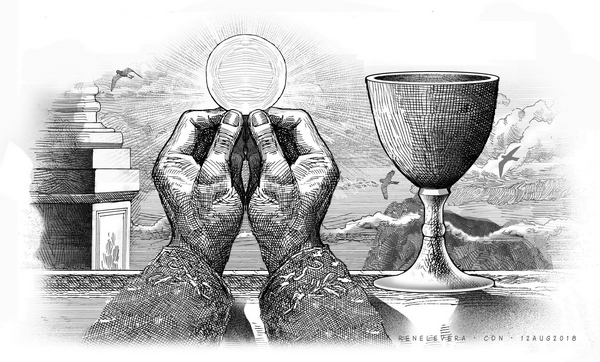Feeling like enjoying a bit of Mozart one morning, I played his Ave Verum Corpus, a motet, or short choral piece, the version sung by the Westminster Cathedral Choir. Pope Innocent VI, who lived in the 13th century, wrote this little Latin hymn, which Mozart, as well as Byrd, Elgar, Liszt, Saint-Saëns and many others, found good enough to set to music.
During the Middle Ages, the choir intoned the Ave Verum during the Mass when the priest raised the host after pronouncing upon it the words of consecration, which Jesus said at the Last Supper — “Take this, all of you, and eat of it: for this is my body which will be given up for you.”
Here is an English translation of the hymn:
Hail, true body,
Born of the Virgin Mary;
Who has truly suffered, slaughtered
On the Cross for humanity,
Whose side was pierced,
Pouring out water and blood.
Be a foretaste for us
During our ordeal of death.
Already in Chapter 6 of the Gospel of John, Jesus laid the basis for the Eucharist, in which the bread and wine become his body and blood. He said to the Jews: “Amen, amen, I say to you, unless you eat the flesh of the Son of Man and drink his blood, you do not have life within you.”
He added, “Whoever eats my flesh and drinks my blood has eternal life, and I will raise him on the last day. For my flesh is true food, and my blood is true drink. Whoever eats my flesh and drinks my blood remains in me and I in him.”
The Jews, offended by what Jesus said, muttered, “How can this man give us his flesh to eat?” And many of his disciples turned away — “This saying is hard; who can accept it?” But Jesus stood pat with what he said.
The Church Fathers, especially those who lived in the first and second centuries, some of whom had known the apostles, of whom they were many of them immediate successors, unanimously upheld Jesus’ real presence in the consecrated bread and wine.
For instance, Ignatius of Antioch (c. 110 A.D.) wrote, “I have no taste for corruptible food nor for the pleasures of this life. I desire the Bread of God, which is the flesh of Jesus Christ, who was of the seed of David; and for drink I desire this blood, which is love incorruptible.”
Similarly, Justin Martyr (c. 100-165 A.D.) remarked that “the food which has been made into the Eucharist by the Eucharistic prayer set down by Him, and by the change of which our blood and flesh is nourished, is both the flesh and the blood of that incarnated Jesus.”
Not infrequently, during my treatment for cancer, I would feel a deep sadness and sense the hiddenness of God, for which reason I would go to Holy Communion as soon as I could, and there be united to Jesus, spiritually as well as physically, as I chewed the sacred host.
At that moment I could very well have sung, “Ave verum corpus! Hail, praise to you, O holy body of Christ!
Disclaimer: The comments uploaded on this site do not necessarily represent or reflect the views of management and owner of Cebudailynews. We reserve the right to exclude comments that we deem to be inconsistent with our editorial standards.

